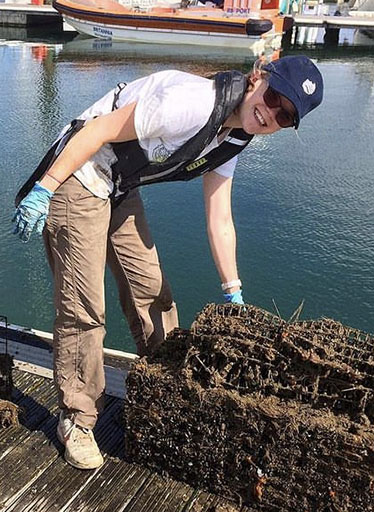
For Marine Biology student Eleanor Spencer, success isn’t only measured by the goals she has achieved in life, but by the obstacles which she has overcome.
Tasmania is a long way from home, what’s your story?
I was born in the United Kingdom and then moved to Switzerland on my third birthday. I lived there for most of my life but did go back to the UK for my Bachelors and Masters degrees.
I had been to Australia before, when I came to do a summer internship at James Cook University in 2017. However, this is my first time in Tasmania and it’s perfect – the sea, the mountains – it’s very much an outdoor lifestyle, and I love going walking and paddleboarding.
What made you choose a PhD in Marine Biology?
I have always wanted to study Marine Biology. I volunteered to work at my local zoo while I was in High School, but I wasn’t a big fan of that because being in a landlocked country, all they had was an aquarium. During my time at University, I managed to do multiple internships in different marine ecosystems – one involved studying river fish, another focused-on sea turtles. Sometimes the best way to get these opportunities is by talking with the right people and showing how passionate you are. That’s one of the main reasons why I am here today.
You have been waiting a long time to start the PhD, what happened?
I was literally locked out of Australia due to COVID-19 travel restrictions, so I had to wait about two years to start my PhD because of the pandemic. It was tough waiting so long, especially since there was some uncertainty whether the University would be able to hold my scholarship. It was very touch-and-go. I managed to get to Tasmania in December 2021 and had my very first summer-time Christmas!
What were your early education years like?
Because of my dyslexia, I really struggled at school until year nine. I wasn’t a very good student and my marks were very low – I was actually failing. I had to keep pushing myself hard and by the time I got to middle school my grades started to improve to the point I was average. I had teachers, and even my Principal, tell my parents that I would never be able to sit my High School exams if I wasn’t held back because they thought I would fail. Despite their objections, I pushed forward and I went on to complete my Bachelor and Masters and now I am doing a PhD – I made it!
What changed during your later school years?
I found my passion. I saw my goal and I was determined to get there. A teacher once gave me a book to read on marine biology. I’d never read it before and I didn’t know any of the terminology, but I didn’t stammer at all even though it was a much harder book to read. Learning is all about passion for me, it’s a stimulant. I could never read the books that I did not enjoy emotionally.
When were you first diagnosed with dyslexia?
I was diagnosed quite young, at the age of 8, because my Mum recognised the signs. She also had dyslexia and was undiagnosed. Despite her own struggles, she also succeeded after years of working hard. She is my role model.
Have your parents always been very supportive?
Absolutely. I’m never going to say that I did this all by myself when the truth is I had a great support network through my family. One of my Dad’s favourite sayings is ‘Per ardua ad astra’, which basically means through hard work you reach the stars. And that is what they both helped me to do.
Did you have any support other than family?
My favourite teacher was my final year chemistry teacher. He told my parents that although I do have some learning issues, I was highly intelligent. It was the first time anyone outside of my family had ever said that to me. Reminding a student that they’re intelligent, or just telling them that they see and recognise how hard they work, that’s important.
What’s the best advice you can give a student with learning disabilities?
You’re not dumb! Don’t let anyone ever make you think you are. Some of the top scientists at my university have a learning disability, in fact, it’s fairly common. Our minds work differently to everyone else’s, and that’s amazing! It means we can see things from a different perspective. We are always asking why, and our curiosity is our biggest asset. You have to give 110% effort for everything you do and it will pay off in the long run.
Never stop talking! Raise that hand in class and give your best answer. Even if you get answers wrong, you learn from your mistakes. It can feel awkward when you do, but it means you’re learning. One of the biggest things I struggle with is asking for help; it makes me feel as though I am unable to do something that everyone else finds simple to do. One of the best things I have learned from doing a PhD is asking for help when you need it. By doing so, you learn and get to where you want to be faster. Never compare yourself to others: Self-confidence has never been easy for me, especially when it comes to my own ability in academia. What makes it worse is thinking that others are doing better than me. When the truth is, I am succeeding. It’s so easy to lose focus when you compare yourself to other people. We all struggle and go at different paces. Who says your pace is wrong? Quite often you need to take your own road.